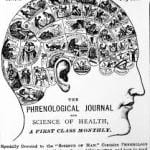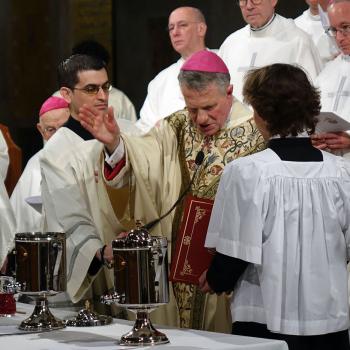Middle Passage is a knife-thin, knife-sharp novel of revolt on a slave ship returning from the African coast. Charles Johnson, a black American Buddhist for whom all life is in essence One and division is simply a destructive illusion, wrings a violent parable from slavery, the most extreme form of division from the Other. It’s Lovecraftian, with all Lovecraft’s genius for depicting the horror of the formless, ancient, divine, and Other; it’s drunk on the language of ships, the horrors of the stinking “orlop” where the sailors sling their hammocks, the riot of educated references and allusions. By the end it’s as clotted with viscera as a Stephen King novel, but it’s also frequently very, very funny, and finds time even in its final reunion scene to throw in a parody of Penelope unweaving as she waits for Odysseus. It’s just great stuff, easily one of the best novels I’ve read this year.
I’ve read two collections of Johnson’s short stories. A lot of Night Hawks seemed tendentious, but The Sorcerer’s Apprentice is a bag full of smart, strange fables. Johnson is a Buddhist the way Graham Greene is a Catholic: The world he depicts is a world where Buddhism is true, and often his characters do profess all or some of this philosophy, but they also live crosswise to Buddhism, seeking out forms of ecstasy which hint at a misfiring longing for what Buddhism offers. Even their lies are ways of speaking truths. Take this description, from Middle Passage:
Slipping away from my watch and into his room, easing his door shut with my fingertips, I felt the change come over me, a familiar, sensual tingle that came whenever I broke into someone’s home, as if I were slipping inside another’s soul. Everything must be done slowly, deliberately, first the breath coming deep from the belly, easily, as if the room itself were breathing, limbs light like hollow reeds, free of tension, all parts of me flowing as a single piece, for I had learned in Louisiana that in balletlike movements there could be no error of the body, no elbows cracking into chair arms in a stranger’s space to give me away. Theft, if the truth be told, was the closest thing I knew to transcendence. Even better, it broke the power of the propertied class, which pleased me. As a boy I’d never had enough of anything.
This is our hero, Rutherford Calhoun, a manumitted slave turned general lowlife who fled a forced marriage by stowing away on what turned out to be a slaver. Calhoun tries to come to terms with the harsh and abusive world of the ship and with its cracked-genius captain, who believes that at the heart of all human life lies war. They reach Africa and it turns out that the captain is not only after human cargo, but something else–something greater, older, more thoroughly Other. We know from the beginning that the voyage will be a disaster.
Johnson depicts the horror of formlessness–the fog, the sea, where you can’t know up from down, self from other. But he also depicts the horror of division and the dream that perhaps we truly all are one. Twice in this book we see the choices people make when they’re starving, when they know that any crumb they eat is stolen from someone else’s mouth. The evil of division couldn’t be sharper. The Allmuseri, the tribe whose captives are taken as cargo, speak a language in which can be heard all the tongues of Africa. Their very name suggests that they share in all life somehow. The last third of the book includes some truly horrific descriptions of violence and disease; amputations divide the body and cannibalism is the only way the people on board the doomed Republic can become one. (“O I am a cook and a captain bold/And the mate of the Nancy brig….”) But so far I’ve never found Johnson to be a writer of despair. This book ends with desire thwarted, but in a way which suggests a life beyond desire: a life of peace and unity, an abnegation of the hungry self.
For Christians desire plays a different role. God will make us like Himself; I don’t understand it, or particularly desire it!, but we are promised theosis. The Eucharist transforms us into the One Whom we eat, overcoming the division between God and man displayed so vividly on the Cross–and in doing so defeats our cannibalistic attempts to consume one another.
And yet difference is beloved. Difference, and love for the Other because of that otherness, rejoicing in difference, stoke the Church’s bridal imagery. As the deer longs for running streams/My soul longs for you, my God. In the mystery of the Trinity we see that difference exists even within the One God. Even “difference vs. unity” is a dichotomy which God unspeaks. Desire draws us to union with the Other; we submit in swooning ecstasy to an Other Who binds Himself to us and serves us and puts Himself in our hands and mouths and bodies, and with Him alone power is no longer a threat.
Middle Passage is full of images of flow, loss of the skin separating one being from another. It meditates on self-gift, and what it might mean to treat all beings as equals in a world where some of those “equals” own you as chattel. Its humor often comes from our ambitions: As Rutherford notes when he learns the nature of the secret cargo, “The Apocalypse would definitely put a crimp in my career plans.”
This is a novel full of character, adventure, pure horror, spangled drenching prose; it will also make you reflect, for a long time, on property and creaturehood, victory and sex, and all the other separations which characterize our life, on earth or sea.
Shipwreck of the SS American Star photo via Wikipedia.
















